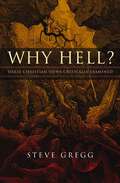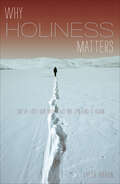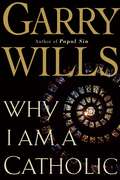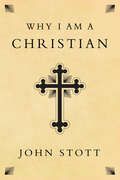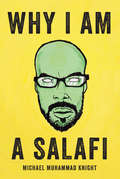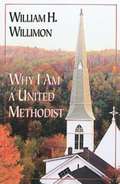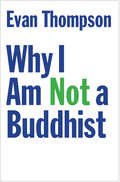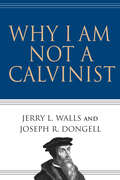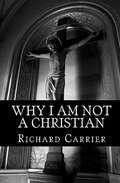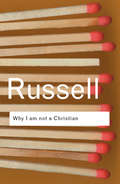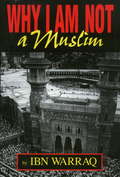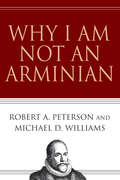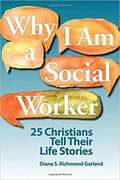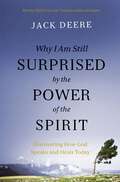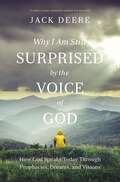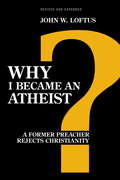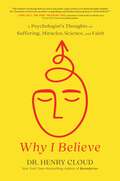- Table View
- List View
Why Hell?: Three Christian Views Critically Examined
by Steve GreggMost people believe that hell is the final state of the condemned following the final judgment. At the same time, many people cannot comprehend why God created hell for the unsaved. Respected church fathers held a variety of views dating back to the early centuries of the church. This book explains views on why hell exists: unending suffering, the annihilation of the unrepentant, and the rehabilitation of the lost. Most Christians are unaware of the scriptural basis for each of these positions. Why Hell? is meant to educate the interested reader without advocating for any one point of view. The following are some of the book's features:Biblical vocabulary of hell and positions held throughout early Christian historyPositive cases presented on three perspectives: traditionalist, conditionalist, and restorationistCritiques of each viewHelpful charts at the back of the book that summarize and cross-examine the arguments for each viewSteve Gregg provides food for thought for both trained theologians and serious Christian readers who want all the data and then consider for themselves the consequences of three Christian perspectives on hell.
Why Holiness Matters: We've Lost Our Way--But We Can Find it Again
by Tyler BraunHave we tried so hard to avoid being holier-than-thou that we&’ve forgotten how important it is to be holy?Authenticity matters. Transparency matters. Being open about our shortcomings, misgivings, and failures matters. Yet holiness also matters. This book is a timely reminder not to lose the old priorities as we take on the new, albeit noble, ones. Millennial author Tyler Braun helps us understand that holiness is not just some fine ideal destined for generations past; it&’s the unyielding pursuit that defines every Christian life. The beginning of our calling toward a holy life is the challenge of loving God more deeply. Holiness is not found in strict rule keeping alone; it is found in our desire of the Holy One. Holiness is not new behaviors. Holiness is new affections.
Why Holiness Matters: We've Lost Our Way--But We Can Find it Again
by Tyler BraunHave we tried so hard to avoid being holier-than-thou that we&’ve forgotten how important it is to be holy?Authenticity matters. Transparency matters. Being open about our shortcomings, misgivings, and failures matters. Yet holiness also matters. This book is a timely reminder not to lose the old priorities as we take on the new, albeit noble, ones. Millennial author Tyler Braun helps us understand that holiness is not just some fine ideal destined for generations past; it&’s the unyielding pursuit that defines every Christian life. The beginning of our calling toward a holy life is the challenge of loving God more deeply. Holiness is not found in strict rule keeping alone; it is found in our desire of the Holy One. Holiness is not new behaviors. Holiness is new affections.
Why I Am a Catholic
by Garry WillsIn this provocative work, which could not be timelier, Garry Wills, one of our country's most noted writers and historians, offers a powerful statement of his Catholic faith. Beginning with a reflection on his early experience of that faith as a child and later as a Jesuit seminarian, Wills reveals the importance of Catholicism in his own life. He goes on to challenge, in clear and forceful terms, the claim that criticism or reform of the papacy is an assault on the faith itself. For Wills, a Catholic can be both loyal and critical, a loving child who stays with his father even if the parent is wrong. Wills turns outward from his personal experiences to present a sweeping narrative covering two thousand years of church history, revealing that the papacy, far from being an unchanging institution, has been transformed dramatically over the millennia -- and can be reimagined in the future. At a time when the church faces one of its most difficult crises, Garry Wills offers an important and compelling entrée into the discussion of the church's past -- and its future. Intellectually brisk and spiritually moving, Why I Am a Catholic poses urgent questions for Catholic and non-Catholic readers alike.
Why I Am a Salafi
by Michael Muhammad KnightThe Salafi are a revivalist Sunni Muslim movement misunderstood by most Americans, and even many Muslims. The New York Times' first reference to Salafis as a distinct group appears in 1979 after a band of armed men seized control of the Great Mosque in Mecca. After 1979, there is not another mention of Salafis in the Times until 2000, in an article on links between Yemeni radicals and Osama Bin Ladin. In 2013, an article appeared in USA Today labeling Salafis as Sunni Islam's "most radical sect" and declaring them "the most anti-Western" of any Islamist group. Today, Salafism is widely implicated in the rise of ISIS.Knight-an acclaimed writer who has explored his own evolving religious beliefs in a range of novels, memoirs and essays-uses this mislabeling as yet another opportunity to engage those corners of Islamic tradition that others might dismiss as absurd or dangerous.Why I am Salafi examines problems of interpretation, practice, and community, illustrating why terms like orthodox or progressive, Sufi or Salafi often fail to convey the reality of Muslim experience. Knight's analysis includes examination of his own complex religious journey, having converted to Islam at sixteen, studying at a madrassa in Pakistan at seventeen, to
Why I Am a United Methodist
by William H. WillimonIn seven chapters, Willimon examines United Methodism and the ways it has made and continues to make a difference in his life. In an inspiring and enlightening way, he writes of his pride in being part of a church that has grown from one man's experience to a worldwide movement covering the globe with its message. A learning guide for groups and individuals is included. Chapter titles: Because Religion Is of the Heart Because the Bible Is Our Book Because Religion Is Practical Because Christians Are to Witness Because Christians Are to Grow Because Religion Is Not a Private Affair
Why I Am an Agnostic and Other Essays: Including Expressions of Faith from a Protestant, a Catholic and a Jew
by Clarence S. DarrowThe renowned lawyer Clarence Darrow (1857-1938) was also an impassioned defender of intellectual freedom, individual liberties, and social justice. In these wide-ranging essays, Darrow attacks beliefs in the inerrancy of the Bible, the immortality of the soul, miracles, and heaven as being completely at odds with human experience and science. The life best lived, Darrow contends, is one that is ruled by reason, uncluttered by dogmatism, and aided by compassion for our fellow human beings.
Why I Am Not a Buddhist
by Evan ThompsonA provocative essay challenging the idea of Buddhist exceptionalism, from one of the world&’s most widely respected philosophers and writers on Buddhism and science Buddhism has become a uniquely favored religion in our modern age. A burgeoning number of books extol the scientifically proven benefits of meditation and mindfulness for everything ranging from business to romance. There are conferences, courses, and celebrities promoting the notion that Buddhism is spirituality for the rational; compatible with cutting-edge science; indeed, &“a science of the mind.&” In this provocative book, Evan Thompson argues that this representation of Buddhism is false. In lucid and entertaining prose, Thompson dives deep into both Western and Buddhist philosophy to explain how the goals of science and religion are fundamentally different. Efforts to seek their unification are wrongheaded and promote mistaken ideas of both. He suggests cosmopolitanism instead, a worldview with deep roots in both Eastern and Western traditions. Smart, sympathetic, and intellectually ambitious, this book is a must-read for anyone interested in Buddhism&’s place in our world today.
Why I Am Not a Calvinist
by Jerry L. Walls Joseph R. DongellWhat's wrong with Calvinism? Since the Reformation, Calvinism has dominated much of evangelical thought. It has been so well established that many Christians simply assume it to be the truest expression of Christian doctrine. But Calvinism has some serious biblical and theological weaknesses that unsettle laypeople, pastors and scholars alike. God is sovereign. All evangelical Christians--whether Arminians or Calvinists--have no doubt about this fundamental truth. But how does God express his sovereignty? Is God a master puppeteer, pulling our strings? Or has he graciously given his children freedom to respond to his love? In this eminently readable book, Jerry L. Walls and Joseph R. Dongell explore the flaws of Calvinist theology. Why I Am Not a Calvinist is a must-read for all who struggle with the limitations of this dominant perspective within evangelical theology.
Why I Am Not a Christian: Four Conclusive Reasons to Reject the Faith
by Richard CarrierDr. Richard Carrier, world renowned philosopher and historian, explains the four reasons he does not accept the Christian religion, describing four facts of the world that, had they been different, he would believe. He is brief, clear, and down to earth, covering the whole topic in under ninety pages of easy to-read explanation. Those four reasons are God's silence, God's inaction, the lack of evidence, and the way the universe looks exactly like a godless universe would, and not at all like a Christian universe would, even down to its very structure. Dr. Carrier addresses all the usual replies to these claims, in ways you might not have heard before, relying on his wide experience in debating and studying these issues all over the world for more than fifteen years. A perfect book to introduce yourself, or your friends, to why fewer educated people are embracing Christianity than ever before. Ideal for handing out to door-to-door missionaries.
Why I am not a Christian: and Other Essays on Religion and Related Subjects (Routledge Classics)
by Bertrand RussellWhile its tone is playful and frivolous, this book poses tough questions over the nature of religion and belief. Religion provides comfortable responses to the questions that have always beset humankind - why are we here, what is the point of being alive, how ought we to behave? Russell snatches that comfort away, leaving us instead with other, more troublesome alternatives: responsibility, autonomy, self-awareness. He tells us that the time to live is now, the place to live is here, and the way to be happy is to ensure others are happy.
Why I Am Not a Muslim
by Ibn WarraqThose who practice the Muslim faith have resisted examinations of their religion. They are extremely guarded about their religion, and what they consider blasphemous acts by skeptical Muslims and non-Muslims alike has only served to pique the world's curiosity. This critical examination reveals an unflattering picture of the faith and its practitioners. Nevertheless, it is the truth, something that has either been deliberately concealed by modern scholars or buried in obscure journals accessible only to a select few.
Why I Am Not a Muslim
by Ibn WarraqThose who practice the Muslim faith have resisted examinations of their religion. They are extremely guarded about their religion, and what they consider blasphemous acts by skeptical Muslims and non-Muslims alike has only served to pique the world's curiosity. This critical examination reveals an unflattering picture of the faith and its practitioners. Nevertheless, it is the truth, something that has either been deliberately concealed by modern scholars or buried in obscure journals accessible only to a select few.
Why I Am Not a Muslim
by Ibn WarraqThose who practice the Muslim faith have resisted examinations of their religion. They are extremely guarded about their religion, and what they consider blasphemous acts by skeptical Muslims and non-Muslims alike has only served to pique the world's curiosity. This critical examination reveals an unflattering picture of the faith and its practitioners. Nevertheless, it is the truth, something that has either been deliberately concealed by modern scholars or buried in obscure journals accessible only to a select few.
Why I Am Not an Arminian
by Robert A. Peterson Michael D. WilliamsWhat's wrong with Arminianism? Arminian theology is sweeping through the evangelical churches of North America. While most Arminians are good, sincere, orthodox Christians, authors Robert A. Peterson and Michael D. Williams contend that aspects of Arminian thought are troubling both biblically and theologically. In particular, they argue, Arminians have too lofty a view of human nature and an inadequate understanding of God's sovereign love in Christ. Why I Am Not an Arminian explores the biblical, theological and historical background to the Calvinist-Arminian debate. The irenic nature and keen insight of this book will be appreciated by laypeople, pastors and scholars alike.
Why I Am Not A Christian: And Other Essays On Religion And Related Subjects
by Bertrand RussellThoughts on life after death, man's place in the universe, and other contemplative subjects.
Why I Am A Social Worker: 25 Christians Tell Their Life Stories
by GarlandWhy I Am a Social Worker describes the rich diversity and nature of the profession of social work through the 25 stories of daily lives and professional journeys chosen to represent the different people, groups and human situations where social workers serve. Many social workers of faith express that they feel called to help people - sometimes a specific population of people such as abused children or people who live in poverty. Often they describe this calling as a way of living out their faith. Why I Am a Social Worker serves as a resource for Christians in social work as they reflect on their sense of calling, and provides direction to guide them in this process. Why I Am a Social Worker employs a narrative, descriptive approach, allowing the relationship between faith and practice to emerge through the professional life stories of social workers who are Christians. As such, it provides a way to explore integration on personal, emotional and practical levels. Why I Am a Social Worker does not varnish the difficulties and struggles of this integration journey, but if you want to understand what social work is and how Christians live their faith from the experiences of actual social work, this book is for you. Why I Am a Social Worker has three main objectives: 1) To describe the path of Christians into social work, how their work is an expression of their faith, and how their faith motivates, sustains, and is challenged by their work. 2) To sample the breadth of social work as a profession, from public to private and from nonsectarian to religious congregational settings, and how faith finds a diversity of expressions. 3) To serve as a resource for exploring the ethical integration of faith with professional practice. Why I Am a Social Worker addresses a range of critical questions such as: a) How do social workers describe the relationship of their faith and their work? b) What is their daily work-life like, with its challenges, frustrations, joys and triumphs? c) What was their path into social work, and more particularly, the kind of social work they chose? d) What roles do their religious beliefs and spiritual practices have in sustaining them for the work, and how has their work, in turn, shaped their religious and spiritual life? Why I Am a Social Worker will provide you with a realistic view of the gritty realities of a profession that is at the forefront of serving those Jesus described as the least of these (Matthew 25).
Why I Am Still Surprised by the Power of the Spirit: Discovering How God Speaks and Heals Today
by Jack S. DeereWhen Jack Deere turned seventeen, he did not know God or a single verse of Scripture. At twenty-seven, he became a professor of Old Testament Exegesis and Semitic Languages at Dallas Theological Seminary. He started and pastored an influential church in Ft. Worth, Texas. He taught his church and his students that God no longer gave the "miraculous gifts of the Spirit" or spoke outside the pages of Scripture.After teaching seminary for ten years, a bestselling author shocked Deere when he told him that he not only believed God was regularly healing people today, but that he had seen undeniable miracles in answer to his prayers. For the next four months, Deere studied every healing story in the New Testament. This time he came to those stories with the open mind of a scholar, completely at home in the original languages of the Bible, not as a gullible student swallowing the prejudices of his teachers. At the end of those four months, Deere was convinced, against his will, that God was still healing and speaking just as he had done in the New Testament.Deere and his wife Leesa began to pray for people in their church and witnessed dramatic, documented healings.In Why I Am Still Surprised by the Power of the Spirit, Deere demonstrates that the Scriptures teach that God is healing and speaking today just as he did 2000 years ago. He tells documented stories of modern miracles. He explains the nature of spiritual gifts, defines each spiritual gift, offers sound advice on discovering and using the gifts in church today. He shows how all of this part of God's way of deepening our friendship with him.A modern classic, Surprised by the Power of the Spirit was published twenty-five years ago, and in that book Deere claimed that he would live long enough to see the majority of conservative evangelicals come to believe in all the gifts of the Spirit. That has come true. The theological landscape has changed dramatically. Nearly completely rewritten, this new edition still offers that proof but has about seventy percent new material on the practical matters of experiencing and using spiritual gifts. For example, anyone who prays regularly for the sick will encounter demonic power. Demons pop up all over the Synoptic Gospels. There are two new chapters on ministering to the demonized. There is much confusion on what it means to be filled with the Spirit today. Deere takes three chapters to examine every use of "filled with the Spirit" and "full of the Spirit" in the New Testament to show why and how God still fills his servants with the Holy Spirit. There are many new stories of God's power, even walking on water and multiplying food. Deere also introduces the newest literature defending and explaining the gifts of the Spirit. All this and more continues the book's legacy for a new time.
Why I Am Still Surprised by the Voice of God: How God Speaks Today Through Prophecies, Dreams, and Visions
by Jack S. DeereJesus knew the Bible better than anyone, yet he claimed that he had to hear his Father's voice in order to fulfill God's purposes for his life. His enemies, the religious elite, had supreme confidence in their knowledge of Scripture, yet Jesus said that none of them had ever heard the voice of the Father.When Jack Deere turned seventeen, he did not know God or a single verse of Scripture. Then, one night a friend quoted John 10:28 to him, and he believed in Jesus. At twenty-seven, he became a professor of Old Testament Exegesis and Semitic Languages at Dallas Theological Seminary where he taught his students to avoid the trap of believing that God still spoke outside the pages of the Bible. He believed it was all real--just as the authors of the Old and New Testaments had said it happened--but it no longer happened today. People who believed God had spoken to them personally were emotionally unstable or too lazy to read the Bible.After a trusted friend shared he believed God still spoke today, Jack began a thorough study of every instance of God speaking supernaturally to someone in the New Testament. He saw how they didn't just hear the voice of God; they were dependent on the voice of God to fulfill the highest purpose for their lives. Jack became convinced that we should expect God to speak outside the Scriptures, but he didn't have a clue how to hear his voice.This is the story of how Jack Deere learned to hear the voice of God and, in doing so, became a friend of Jesus.Now a modern classic, Jack wrote Surprised by the Voice of God over twenty-five years ago. Based on that first book, Why I Am Still Surprised by the Voice of God has been entirely rewritten and includes additional thoughts and insights from a lifetime of hearing God speak. Deere guides you through the Bible to discover the variety of creative, deeply personal ways God still communicates with us today. You'll learn how God speaks with people apart from the Bible, though never in contradiction to it. Deere first describes the ways God revealed his thoughts to the men and women of the Bible, and then shares why God continues to speak to us today using the same methods. He provides counsel and guidance for knowing how to accurately hear God speak through prophecies, dreams, visions, and other forms of divine communication. With candor, sensitivity, and a profound understanding of Scripture, Deere identifies our hindrances to hearing the voice of God and calls us to a more intimate relationship with God. Filled with fascinating stories and personal accounts, Why I Am Still Surprised by the Voice of God is for all who want to walk in friendship with God.
Why I Became an Atheist
by John W. LoftusFor about two decades John W. Loftus was a devout evangelical Christian, an ordained minister of the Church of Christ, and an ardent apologist for Christianity. With three degrees--in philosophy, theology, and philosophy of religion--he was adept at using rational argumentation to defend the faith. But over the years, doubts about the credibility of key Christian tenets began to creep into his thinking. By the late 1990s he experienced a full-blown crisis of faith. In this honest appraisal of his journey from believer to atheist, the author carefully explains the experiences and the reasoning process that led him to reject religious belief. The original edition of this book was published in 2006 and reissued in 2008. Since that time, Loftus has received a good deal of critical feedback from Christians and skeptics alike. In this revised and expanded edition, the author addresses criticisms of the original, adds new argumentation and references, and refines his presentation. For every issue he succinctly summarizes the various points of view and provides references for further reading. In conclusion, he describes the implications of life without belief in God, some liberating, some sobering. This frank critique of Christian belief from a former insider will interest freethinkers as well as anyone with doubts about the claims of religion.From the Trade Paperback edition.
Why I Became an Atheist
by John W. LoftusFor about two decades John W. Loftus was a devout evangelical Christian, an ordained minister of the Church of Christ, and an ardent apologist for Christianity. With three degrees-in philosophy, theology, and philosophy of religion-he was adept at using rational argumentation to defend the faith. But over the years, doubts about the credibility of key Christian tenets began to creep into his thinking. By the late 1990s he experienced a full-blown crisis of faith. In this honest appraisal of his journey from believer to atheist, the author carefully explains the experiences and the reasoning process that led him to reject religious belief. The original edition of this book was published in 2006 and reissued in 2008. Since that time, Loftus has received a good deal of critical feedback from Christians and skeptics alike. In this revised and expanded edition, the author addresses criticisms of the original, adds new argumentation and references, and refines his presentation. For every issue he succinctly summarizes the various points of view and provides references for further reading. In conclusion, he describes the implications of life without belief in God, some liberating, some sobering. This frank critique of Christian belief from a former insider will interest freethinkers as well as anyone with doubts about the claims of religion.
Why I Became an Atheist
by John W. LoftusFor about two decades John W. Loftus was a devout evangelical Christian, an ordained minister of the Church of Christ, and an ardent apologist for Christianity. With three degrees-in philosophy, theology, and philosophy of religion-he was adept at using rational argumentation to defend the faith. But over the years, doubts about the credibility of key Christian tenets began to creep into his thinking. By the late 1990s he experienced a full-blown crisis of faith. In this honest appraisal of his journey from believer to atheist, the author carefully explains the experiences and the reasoning process that led him to reject religious belief. The original edition of this book was published in 2006 and reissued in 2008. Since that time, Loftus has received a good deal of critical feedback from Christians and skeptics alike. In this revised and expanded edition, the author addresses criticisms of the original, adds new argumentation and references, and refines his presentation. For every issue he succinctly summarizes the various points of view and provides references for further reading. In conclusion, he describes the implications of life without belief in God, some liberating, some sobering. This frank critique of Christian belief from a former insider will interest freethinkers as well as anyone with doubts about the claims of religion.
Why I Became an Atheist
by John W. LoftusFor about two decades John W. Loftus was a devout evangelical Christian, an ordained minister of the Church of Christ, and an ardent apologist for Christianity. With three degrees-in philosophy, theology, and philosophy of religion-he was adept at using rational argumentation to defend the faith. But over the years, doubts about the credibility of key Christian tenets began to creep into his thinking. By the late 1990s he experienced a full-blown crisis of faith. In this honest appraisal of his journey from believer to atheist, the author carefully explains the experiences and the reasoning process that led him to reject religious belief. The original edition of this book was published in 2006 and reissued in 2008. Since that time, Loftus has received a good deal of critical feedback from Christians and skeptics alike. In this revised and expanded edition, the author addresses criticisms of the original, adds new argumentation and references, and refines his presentation. For every issue he succinctly summarizes the various points of view and provides references for further reading. In conclusion, he describes the implications of life without belief in God, some liberating, some sobering. This frank critique of Christian belief from a former insider will interest freethinkers as well as anyone with doubts about the claims of religion.
Why I Believe: A Psychologist's Thoughts on Suffering, Miracles, Science, and Faith
by Dr. Henry CloudA leadership expert, clinical psychologist, and New York Times bestselling author asks the big questions and shares his early mental health struggles in this groundbreaking, uplifting book. World-renowned psychologist and leadership expert Henry Cloud has impacted millions of lives through his groundbreaking books and through his work coaching leaders of the most influential organizations in the world. But few people know the details of his own story and how he became one of the most beloved and respected psychologists and faith influencers in America. In this indelibly personal and vulnerable book, Dr. Cloud leads us through his early struggles with illness and depression and the miracles that healed him and led him to his calling as a healer of others. Through masterful storytelling combined with a deeply nuanced understanding of the human mind, Dr. Cloud invites readers to inhabit the spaces of suffering and elation that make us most human and to walk alongside of him as he ponders the great questions we are so often afraid to ask but which also give life meaning. Written in the vein of such groundbreaking books as An Unquiet Mind, When Breath Becomes Air, and On Being Mortal, Why I Believe is a masterwork in spiritual exploration from one of the great scientific minds and faith voices of our time.
